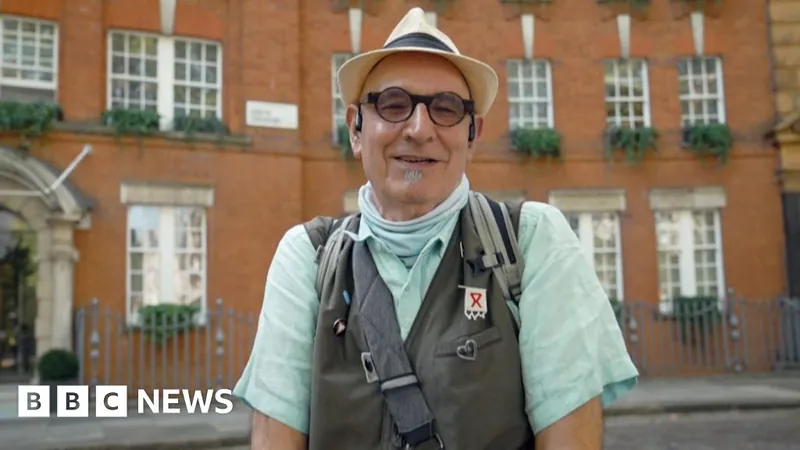
From Death Sentence to Hope: Jonathan Blake's Journey with HIV
2025-05-04
Author: Arjun
At just 33 years old, Jonathan Blake received a life-altering diagnosis: HIV. In a chilling moment, doctors told him he had between three to nine months to live. Now, at 76, he stands as a beacon of hope and activism.
A Historic Diagnosis: Patient L1
Jonathan was diagnosed at the Middlesex Hospital in October 1982, becoming one of the earliest known cases of HIV in the UK. His incredible story gained recognition when it was featured in the 2014 film *Pride*.
"Every single lymph node in my body had just erupted," Jonathan recalled from those early days. Hospitalized in a side ward, he faced the grim prospect of palliative care—a notion he couldn’t accept given his young age. "I thought, I'm only 33!"
The Fight Against a Forgotten Epidemic
HIV attacks the immune system, making it difficult for the body to fend off infections. In contrast, AIDs, which is caused by HIV, occurs when the immune system is severely compromised.
Jonathan's battle continued for years, compounded by stigma until significant awareness arose with the launch of the slogan "U = U" (Undetectable = Untransmittable) in 2015. This pivotal moment meant that those with an undetectable viral load could not transmit HIV.
Progress and Stigma: The Dual Narrative
Despite advancements in treatment, Jonathan highlights the ongoing stigma surrounding HIV. "It’s a forgotten epidemic. People still don’t talk about it enough," he lamented.
According to the Terrence Higgins Trust, by 1999, 33 million people were living with HIV worldwide, marking AIDs as a leading global killer. The latest statistics show an increase in the number of individuals receiving HIV care, with 107,949 people treated in 2023.
Looking Ahead: The Fight for Zero
Jonathan recently attended the launch of the report "Getting to Zero by 2030: HIV in London", which strives to eradicate new HIV infections, stigma, and related deaths in the city. London has been identified as a global leader in treatment and prevention, yet challenges remain.
Krupesh Hirani, chair of the London Assembly Health Committee, noted a concerning rise in new cases since 2020, emphasizing the need for more effective action. The report underlines the importance of increasing testing and accessibility to treatments like PrEP.
A Memorial to Remember and Heal
In a significant development, funding has been secured for a permanent HIV/AIDs memorial in London, set to be unveiled by late 2027. The memorial, designed as a felled tree, aims to honor those lost to the epidemic and foster community healing.
For Jonathan, this memorial embodies a chance to create a supportive community and remember friends lost to the virus. "It still hurts, but this memorial means that everyone who lost their life had meaning," he shared.
A Call to Action
As the city vies to meet its ambitious goals by 2030, Jonathan believes knowledge is power. "Know your status, be brave, get tested. The developments happening are extraordinary, even without a cure. I'm living proof of that." His journey is not just one of survival; it’s an inspiring call to action for all.


 Brasil (PT)
Brasil (PT)
 Canada (EN)
Canada (EN)
 Chile (ES)
Chile (ES)
 Česko (CS)
Česko (CS)
 대한민국 (KO)
대한민국 (KO)
 España (ES)
España (ES)
 France (FR)
France (FR)
 Hong Kong (EN)
Hong Kong (EN)
 Italia (IT)
Italia (IT)
 日本 (JA)
日本 (JA)
 Magyarország (HU)
Magyarország (HU)
 Norge (NO)
Norge (NO)
 Polska (PL)
Polska (PL)
 Schweiz (DE)
Schweiz (DE)
 Singapore (EN)
Singapore (EN)
 Sverige (SV)
Sverige (SV)
 Suomi (FI)
Suomi (FI)
 Türkiye (TR)
Türkiye (TR)
 الإمارات العربية المتحدة (AR)
الإمارات العربية المتحدة (AR)